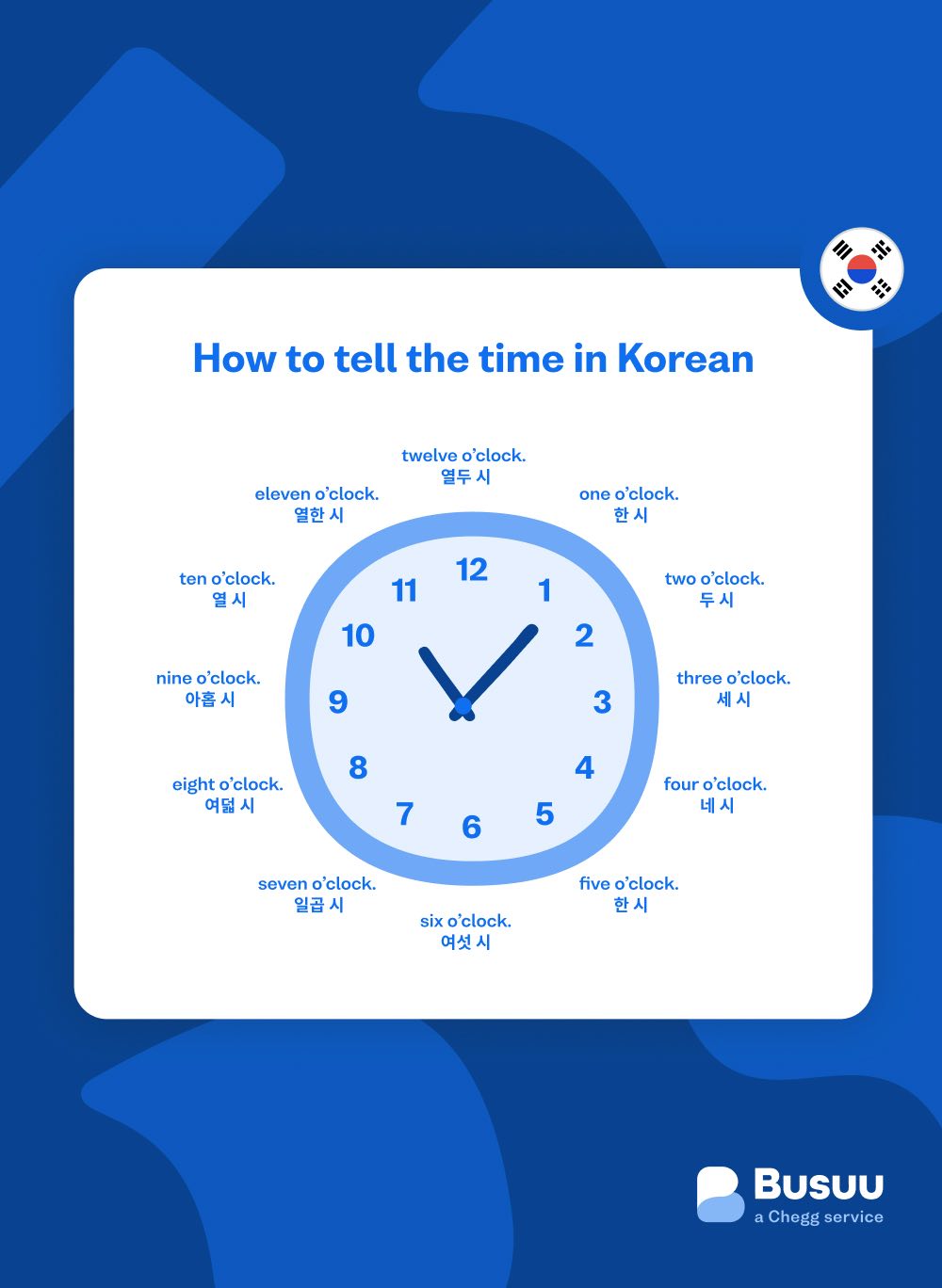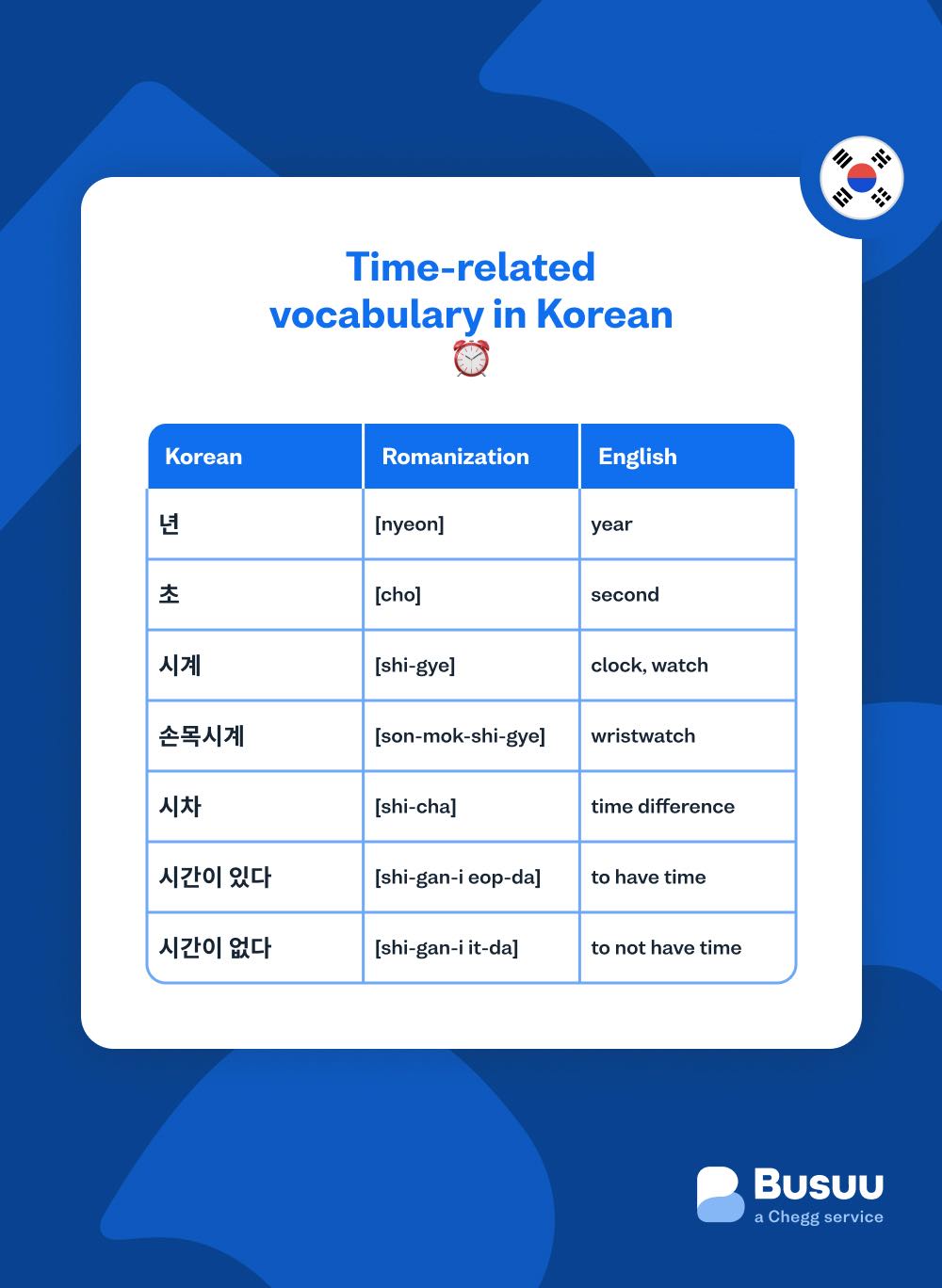How to Tell the Time in Korean?
Let’s learn how to tell the time in Korean, and useful phrases we can use to talk about time!
I want to learn...
Time in Korean is 시간 [shi-gan], so timetable is 시간표 and lunch time is 점심시간, and it’s always interesting to think about the different perception of time for each culture. In Korea, being on time and doing things quickly to save time is valued highly, so being able to talk about time in Korean is an extremely important language skill.
In this article, we will learn how to talk about time in Korean, and different words and phrases we can use to talk about time.
Telling the time in Korean
Telling the time in Korean is very simple. First, to say 1 o’clock, we can say this.
- 한 시 [han shi] - 1 o’clock
In this phrase 한 means 1, and it’s the native Korean number for 1, and 시 means hour, time of the day. The native Korean word for 1 is 하나, but we use the shortened form 한 to tell the time. We also use the shortened forms for numbers 2 (둘 - 두), 3 (셋 - 세), and 4 (넷-네). Below are a few more examples.
- 두 시 [du shi] - 2 o’clock
- 다섯 시 [da-seot shi] - 5 o’clock
- 열한 시 [yeol-han shi] - 11 o’clock
To be more specific and say something like 1:10, we can say this.
한 시 십 분 [han shi ship bum] - 1:10.
In this phrase 분 means minute, and it’s used with Sino-Korean numbers. This is what can make telling the time a little tricky as we have to use two different numbers systems - we use 시 with native Korean numbers, and 분 with Sino-Korean numbers. Here are a few more examples.
- 네 시 이십오 분 [ne shi i-ship-o bun] - 4:25.
- 열 시 십이 분 [yeol shi ship-i bun] - 10:12
- 열두 시 오십 분 [yeol-du shi o-ship bun] - 12:50
To say the time is 30 minutes past the hour, we can use the word 반 [ban].
- 다섯 시 반 [da-seok shi ban] - 10:30
The word 반 means half, and we often use this word to say that it’s 30 minutes past the hour. It’s also perfectly fine to say 다섯 시 삼십 분 to say ‘5:30’.
In everyday life, we tell the time based on the 12 hour clock, but in certain situations, such as when talking about the departure time of trains and airplanes, we may tell the time based on the 24 hour clock. So if a flight leaves at 15:10, you can say this.
- 십오 시 십 분 [ship-o shi ship bun] - 15:10
While the phrase looks pretty much the same as the phrase used to tell the time based on the 12 hour clock, there is one big difference. When we tell the time based on the 24 hour clock, we only use Sino-Korean numbers. So do keep this in mind.
- 십칙 시 사십 분 [ship-chil shi sa-ship bun] - 17:40
- 십일 시 이십 분 [ship-il shi i-ship bun] - 11:20
In English, it’s common to tell the time using sentences like ‘It’s 10 to 6.’ or ‘It’s 10 past six.’. However, such expressions are not common in Korean. We occasionally use sentences like ‘It’s 10 to 6.’, but rarely use sentences like ‘It’s 10 past six’.
- 여섯 시 십 분 전이에요. [Yeo-seot shi ship bun jeon-i-e-yo.] - It’s 10 to 6.
So in this sentence, we first say the hour (여섯 시), and then say the minute (십 분), and then we have 전 (before) and 이에요 (to be). So the whole sentence kind of means ‘It’s 10 minutes before 6’. Below are some more example sentences.
- 열 시 오 분 전이에요. [Yeol shi o bun jeon-i-e-yo.] - It’s 5 to 10.
- 두 시 십 분 전이에요. [Du shi ship bun jeon-i-e-yo.] - It’s 10 to 2.

Asking what time it is in Korean
Asking what time it is and answering this question is very simple. To ask what time it is, we can ask the following question.
- 몇 시예요? [Myeot shi-ye-yo?] - What time is it?
- 지금 몇 시예요? [Ji-geum myeot shi-ye-yo?] - What time is it now?
- 실례합니다, 지금 몇 시예요? [Shil-e-ham-ni-da ji-geum myeot shi-ye-yo?] - Excuse me, what time is it now?
지금 means now, so we can add this word in front of 몇 시예요 to ask what time it is now. 실례합니다 means ‘excuse me’, so you can use this word when you’re asking strangers for time.
In Korean, it’s important to use polite language when speaking to strangers, especially if they seem older than you. So if you have to ask what time it is to someone who is looks older than you, you can ask this question.
- 실례합니다, 지금 몇 시인지 아세요? [Shil-e-ham-ni-da ji-geum myeot shi-in-ji a-se-yo?] - Excuse me, do you know what time it is now?
This is a more polite way of asking the time.
Answering these questions is very simple, and there is only one way to answer this question.
- 두 시예요. [Du shi-ye-yo.] - It’s 2 o’clock.
- 열시 시 십 분이에요. [Yeol shi ship bun-i-e-yo.] - It’s 10:10.
- 일곱 시 반이에요. [Il-gop shi ban-i-e-yo.] - It’s 7:30.
So we say the time, and use the polite form of 이다 (to be), either 예요 (with nouns ending in vowels) or 이에요 (with nouns ending in consonants).
Different times of the day in Korean
To refer to AM and PM, we use the words 오전 (AM) and 오후 (PM). The syllable 오 means noon, and it’s used with either 전 (before) or 후 (after), so 오전 means ‘before noon’, and 오후 means ‘after noon’.
- 오전 열한 시 [o-hu yeol-han shi] - 11AM
- 오후 네 시 반 [o-jeon ne shi ban] - 4:30PM
We can also use words like morning and afternoon.
- 아침 [a-chim] - morning
- 오후 [o-hu] - afternoon
- 저녁 [jeo-nyeok] - evening
- 밤 [bam] - night
- 새벽 [sae-byeok] - dawn
Using these words, we can refer to specific times during the day.
- 아침 일곱 시 [a-chim il-gop shi] - 7 o’clock in the morning (7AM)
- 저녁 여섯 시 [jeo-nyeok yeo-seot shi] - 6 o’clock in the evening (6PM)
- 새벽 두 시 [sae-byeok du shi] - 2 o’clock at dawn (2AM)
To refer to either noon or midnight, we use the following words.
- 정오 [jeong-o] - noon
- 자정 [je-jeong] - midnight
We can also sometimes say 낯 12시 (12 o’clock in the day) to refer to noon, and 낮 [nat] means ‘day, daytime’. To say midnight, we can also say 밤 12시 (12 o’clock at night).
Time related phrases in Korean
The most common particle we use with time is the particle 에 [e]. It’s similar in meaning to the English preposition ‘at’.
- 저는 아침 일곱 시에 일어나요. [Jeo-neun a-chim il-gop shi-e il-eo-na-yo.] - I get up at 7 in the morning.
- 저는 오후 한 시에 점심을 먹어요. [Jeo-neun o-hu han shi-e jeom-sim-eul meo-geo-yo.] - I eat lunch at 1 in the afternoon.
To talk about approximate amount of time, we often use the word 쯤 [jjeum]. We use 쯤 to refer to approximate amount of something, and it’s often used with the time particle 에, so we use 쯤에 to talk about doing something around a certain time.
- 저는 아침 일곱 시쯤에 일어나요. [Jeo-neun a-chim il-gop shi-jjeum-e il-eo-na-yo.] - I get up around 7 in the morning.
- 저는 오후 한 시쯤에 점심을 먹어요. [Jeo-neun o-hu han shi-jjeum-e jeom-sim-eul meo-geo-yo.] - I eat lunch around 1 in the afternoon.
To talk about doing some from a certain time, we can use 부터 [bu-teo]. We can use 부터 with time related phrases to talk about doing something from a certain time.
- 저는 아침 여덟 시부터 일해요. [Jeo-neun a-chim yeo-deol shi-bu-teo il-hae-yo.] - I work from 8 in the morning.
- 저는 다섯 시부터 공부해요. [Jeo-neun da-seot shi-bu-teo gong-bu-hae-yo.] - I study from 5.
To talk about doing something until a certain time, we can use 까지 [kka-ji]. As well as time, we can use 까지 with various other time phrases to talk about doing something until a certain time.
- 저는 열 시까지 자요. [Jeo-neun yeol shi-kka-ji ja-yo.] - I sleep until 10 o’clock.
- 저는 다섯 시까지 공부해요. [Jeo-neun da-seot shi-kka-ji gong-bu-hae-yo.] - I study until 5.
We can also use 부터 and 까지 to say from what time until what time something happens. When we use 부터 and 까지 in this way, 까지 can be interpreted to mean until or to.
- 저는 아홉 시부터 일곱 시까지 일해요. [Jeo-neun a-hop shi-bu-teo il-gop shi-kka-ji il-hae-yo.] - I work from 9 to 7.
- 저는 새벽 한 시부터 여섯 시까지 자요. [Jeo-neun sae-byeok han shi-bu-teo yeo-seot shi-kka-ji ja-yo.] - I sleep from 1AM to 6AM.
To say before, we use 전에 [jeon-e], and we can use this word to talk about something happening before a certain time.
- 저는 여덟 시전에 일어나요. [Jeo-neun yeo-deol shi-jeon-e il-eo-na-yo.] - I get up before 8 o’clock.
- 저는 아홉 시전에 퇴근해요. [Jeo-neun a-hop shi-jeon-e twe-geun-hae-yo.] - I get off work before 9 o’clock.
To say after, we use 후에 [hu-e], and we can use this word to talk about something happening after a certain time.
- 저는 열 시후에 운동해요. [Jeo-neun yeol- shi-hu-e un-dong-hae-yo.] - I exercise after 10 o’clock.
- 저는 아홉 시후에 바빠요. [Jeo-neun a-hop shi-hu-e ba-ppa-yo.] - I’m busy after 9 o’clock.

Other useful time related vocabulary in Korean
| Korean | Romanization | English |
|---|---|---|
| 년 | [nyeon] | year |
| 초 | [cho] | second |
| 시계 | [shi-gye] | clock, watch |
| 손목시계 | [son-mok-shi-gye] | wristwatch |
| 시차 | [shi-cha] | time difference |
| 시간이 있다 | [shi-gan-i eop-da] | to have time |
| 시간이 없다 | [shi-gan-i it-da] | to not have time |
Times around the world
South Korea is 9 hours ahead of Greenwich time, and below are some time differences with major cities around the world.
World time differences to Seoul, South Korea
| Seoul | City | Time difference | Time |
|---|---|---|---|
| Saturday, 12PM | Sydney | +1 hour | Saturday, 1PM |
| Saturday, 12PM | Singapore | -1 hour | Saturday, 11AM |
| Saturday, 12PM - | Bangkok | -2 hours | Saturday, 10AM |
| Saturday, 12PM | Dubai | -5 hours | Saturday, 7AM |
| Saturday, 12PM | Paris | -8 hours | Saturday, 4AM |
| Saturday, 12PM | London | -9 hours | Saturday, 3AM |
| Saturday, 12PM | New York | -14 hours | Friday, 10PM |
| Saturday, 12PM | Chicago | -15 hours | Friday, 9PM |
| Saturday, 12PM | Denver | -16 hours | Friday, 8PM |
| Saturday, 12PM | Los Angeles | -17 hours | Friday, 7PM |
Conclusion
Telling the time is one of the most basic language skills, and being able to talk about time with others is fundamentally important. It will help you to make plans with others, allow you to buy tickets for entertainment shows, buy tickets for transport, and make reservations at your favorite Korean BBQ restaurant. So now that you have learned all the basic skills, it’s important for you to practice using what you have learned, so check out our Korean courses where you can practice talking about what time you get up in the morning!
Don’t stop now…Continue learning more Korean!
This is just the beginning of your Korean learning journey! Go ahead and continue learning more Korean grammar via Busuu’s free online courses and learning resources today!

